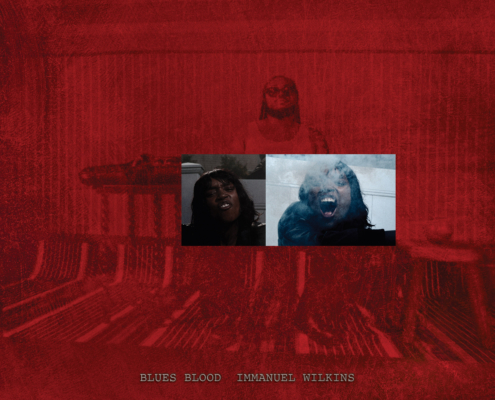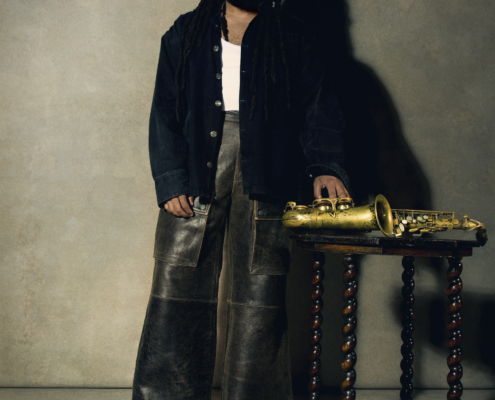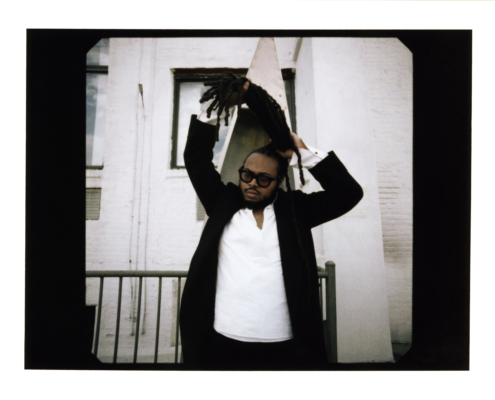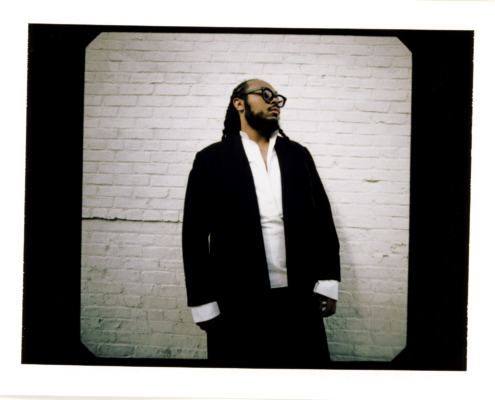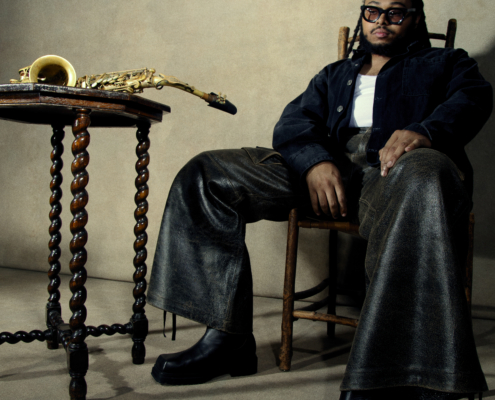Immanuel Wilkins – Blues Blood
- MATTE GLAZE (4:26)
(Immanuel Wilkins, Theaster Gates) - funmi (0:09)
(Michael Olufunmilola Ononaiye) - MOTION (featuring June McDoom) (5:32) (Immanuel Wilkins, Alyssa McDoom)
- EVERYTHING (featuring Esi Sumbry, Ganavya) (6:06)
(Immanuel Wilkins, Alyssa McDoom)
- air (interlude) (0:39)
(Immanuel Wilkins)
- DARK EYES SMILE (featuring Cécile McLorin Salvant) (6:03)
(Immanuel Wilkins, Alyssa McDoom)
- APPARITION (6:38)
(Immanuel Wilkins, Alyssa McDoom) - assembly (interlude) (0:52)
(Immanuel Wilkins)
- AFTERLIFE RESIDENCE TIME (8:40)
(Immanuel Wilkins, Alyssa McDoom) - MOSHPIT (3:21)
(Immanuel Wilkin)
- set! (interlude) (0:21)
(Immanuel Wilkins)
- IF THAT BLOOD RUNS EAST (featuring Yaw Agyeman, Chris Dave) (3:04)
(Immanuel Wilkins, Sekai Edwards, Meshell Ndegeocello)
- your memory (interlude) (0:51)
(Immanuel Wilkins)
- BLUES BLOOD (10:51)
(Immanuel Wilkins, Sekai Edwards)
Immanuel Wilkins: Alto Saxophone, Synthezier, Voice
June McDoom: Vocals / Micah Thomas: Piano / Rick Rosato: Bass / Kweku Sumbry: Drums / Yaw Agyeman: Vocals / Ganavya: Vocals / Esi Sumbry: Voice / Cécile McLorin Salvant: Vocals / Marvin Sewell: Guitar / Michael Olufunmilola Ononaiye: Spoken Word
Produced by Meshell Ndegeocello and Immanuel Wilkins
Altsaxofonist und Komponist Immanuel Wilkins, Gewinner des Deutschen Jazzpreis 2024 in der Kategorie „Live Act des Jahres International“, meldet sich mit seinem dritten Album für Blue Note Records zurück. Schon sein Debüt für das Label, „Omega“, das von der New York Times zum #1 Jazz-Album des Jahres 2020 gekürt wurde, brachte ihm weltweite Beachtung und Anerkennung für sein Spiel und seine ungewöhnlich vielschichtigen Kompositionen ein.
Sein neues Werk „Blues Blood“ bezeichnet er als von seiner Kindheit in der Gegend von Philadelphia inspiriert. Co-produziert wurde es von Meshell Ndegeocello, mit Micah Thomas am Klavier, Rick Rosato am Bass, Kweku Sumbry am Schlagzeug und den Sängern Ganavya, June McDoom und Yaw Agyeman, sowie Gastauftritten von Sängerin Cécile McLorin Salvant, Gitarrist Marvin Sewell und Schlagzeuger Chris Dave. „Blues Blood“ ist Wilkins‘ bislang ambitioniertestes Album und gleichzeitig eine zugängliches, spirituelles Werk über Erinnerungen, das Erbe unserer Vorfahren und die Blutlinien, die Menschen verbinden.
IMMANUEL WILKINS
You don’t appreciate growing up until you look in the mirror and notice something’s different. Though maturing in itself is the act of physical and hormonal evolution, it’s not until you’re in a foreign city, eating something an elder used to cook to see how it compares, that you long for yesteryear. You start to miss that rickety screen door and the couch that no one could sit on. You try to make your grandma’s biscuits and realize they’re not quite hers. This nostalgia anchors Immanuel Wilkins’ third studio album, Blues Blood, a meditative offering partially inspired by his childhood in the Philadelphia area. Co-produced by Meshell Ndegeocello, and featuring Micah Thomas on piano, Rick Rosato on bass, Kweku Sumbry on drums, and vocalists Ganavya, June McDoom and Yaw Agyeman—as well as special guest appearances by vocalist Cécile McLorin Salvant, guitarist Marvin Sewell, and drummer Chris Dave—it’s Wilkins’ most ambitious LP to date, a multimedia performance about the legacies of our ancestors and the bloodlines connecting us.
One can hear dedication to the past right away. Where 2020’s Omega and 2022’s The 7th Hand began with quick, vigorous arrangements that dropped listeners right into the proceedings, Blues Blood begins peacefully, emphasizing tranquility. The opening track “MATTE GLAZE” centers wistful vocals and piano chords that place us in a carpeted living room somewhere in the past. Close your eyes and you can almost see the steam billowing from the kitchen.
On purpose, Blues Blood feels airy and celestial, almost voyeuristic. “It’s like you’re listening in on an activity,” like your mother taking you into the kitchen to share family recipes, Wilkins says. “I wanted the record to feel like people getting together, making music and feeding the pot. Imagine there’s a ball of energy in the middle of the room, and we’re all focused on it.” To that end, Blues Blood floats along, from this space to that space, calmly gathering momentum as it unfolds — like a simmering Crock-Pot slowly coming to a boil. While it has pronounced flourishes, like the hypnotic centerpiece “AFTERLIFE RESIDENCE TIME” and the expansive title track, the music on Blues Blood is mostly serene and atmospheric.
For “AFTERLIFE…,” Wilkins says he was inspired by the idea of generational memory and the teachings of the author Christina Sharpe, who also wrote the liner notes for Blues Blood. “In her book, In The Wake, she talks about how long an element lasts in water,” he says. “She was thinking about the Transatlantic Slave Trade, how blood contains a lot of sodium, and how it has a residence time in water of 260 million years. I started thinking about our ancestors existing in the water, kind of carrying that memory for a long period of time. So that song is about the water and thinking about the Atlantic as this house for memory and for all of our ancestors.”
Blues Blood marks the first time Wilkins has included vocalists on an album. “I was really influenced by Theaster Gates and the Black Monks,” Wilkins says about the blues and gospel ensemble he’s played with recently. “I’ve grown pretty close with Theaster, and he showed me a lot of recordings that were early references for me. The voice is really close to the saxophone in that it’s an air instrument, something you breathe life into.” That influenced the music he wrote for Blues Blood: “I wanted to write music that felt like community. It was about creating this tapestry of vocals, almost like a congregation of voices during their own thing.”
To that end, the voices on this album all tap into different aspects of heritage. On “MATTE GLAZE,” McDoom longs for some form of solace beyond the gaze of bypassing strangers. “Lawd build me a home dwelling,” she sings. “I will not refuse.” On “DARK EYES SMILE,” Salvant sings about a paternal figure in his habitat. It’s a sweet, yet mournful tune about loved ones becoming ancestors, and how grieving tears become comforting ones. “I remember you now your starlight, yesterday, sitting in your best chair,” she reflects. “In my best and worst times, my reflection will resemble you.”
The album title culls inspiration from a quote by Daniel Hamm, a member of the Harlem Six, a group of young boys who were falsely accused of murder in 1964 and severely beaten by prison guards while awaiting trial: “I had to, like, open the bruise up and let some of the blues [bruise] blood come out to show them.” He said this while attempting to seek medical attention for his wounds. The police refused to address Hamm’s injuries because, although they had beaten him themselves, he had no visible blood running across his skin.
Within Hamm’s quote, the mistaken placement of the word ‘blues’ in place of ‘bruise’ when read aloud or silently, lends subtly to a new interpretation of the sentence. “The blues as a feeling has served as a symbol of pleasure in pain for Black folk dating back to work on the plantation,” Wilkins says. “There is a dichotomy of Black people singing songs about how bad their conditions were, yet the blues is something that feels so good.
“Blood is often a symbol of things ancestral and generational,” he continues. “The history and preparation of most foods across the African Diaspora have been passed down through oral tradition. Mothers teach their children recipes that they learned from their mother, and their mother’s mother, so on and so forth, generating a sensorial and ancestral memory through taste and smell.” Meals are cooked onstage during the live performance of Blues Blood. The pan and table are set up with mics, allowing the composition to fill up with the sounds of knives chopping, water boiling, and oil frying in a pan.
While Blues Blood is rooted in the experiences of Wilkins and his collaborators, it’s meant to be a soothing balm for anyone searching for peace, and for Black people trying to reconcile history in a country that tries to erase it. “I don’t even know how to put it in words,” Wilkins says of the album’s sheer potency. “What I do know is that there are alchemical properties in the music. It’s powerful. It’s our calling to take care of this music properly and make sure that it does something to people.”
Konzerte
10.10.24 Mannheim Enjoy Jazz / Alte Feuerwache
21.11.24 Frankfurt hr-Sendesaal
22.11.24 Frankfurt hr-Sendesaal
Weitere Infos in unserem Presseportal unter
https://journalistenlounge.de – bitte dort über den Genrefilter „Jazz“ anwählen!
PR Radio
Universal Music Jazz (Deutsche Grammophon GmbH)
Mühlenstr. 25, 10243 Berlin
Blue Note / Universal Music
CD 00602465552034 / LP 00602465552041
VÖ: 11.10.2024
Live
Wilkins, Immanuel (Quartet) 09.10.2024 Aachen Jazzbunker
Wilkins, Immanuel 10.10.24 Mannheim Alte Feuerwache / Enjoy Jazz
Wilkins, Immanuel & HR big band 21.11.24 Frankfurt HR-Sendesaal
Wilkins, Immanuel & HR big band 22.11.24 Frankfurt HR-Sendesaal

